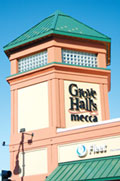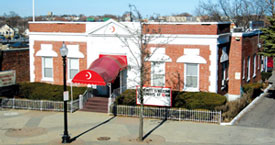
BOSTON (FinalCall.com) – At night, at the crossroads of neighborhoods Roxbury and Dorchester, where most of Boston’s 150,000 Blacks reside, an illuminated clock stands, featuring at its top, silhouette portraits of the Honorable Elijah Muhammad and the Honorable Minister Louis Farrakhan. These silhouettes are joined by images of legendary luminaries such as civil rights activist Rosa Parks, tennis star Arthur Ashe, South African President Nelson Mandela and Dr. Martin Luther King Jr.
The clock stands on Washington Street near the intersections of Blue Hill Avenue and Warren Street near the buildings, Muhammad’s Mosque No. 11 and the Most Worshipful Prince Hall Grand Lodge, F & A.M.A.
Observers say that the clock symbolizes the unity of the Roxbury and Dorchester communities over the past twenty years, as they have struggled to rebuild the neighborhoods where most of Boston’s Black population reside.
Since 1984, members of the mosque, business people and community activists have brought millions of dollars to Roxbury for development.
“Minister Don Muhammad and the Nation of Islam helped in the revival of the greater Roxbury community,” said Bruce Bolling, the first Black president of the Boston City Council. He said that it was Min. Don’s fatherly prodding that galvanized Black leaders to go before the council to bring much needed funding to the community. The landmark achievement resulted in the 2001 construction of Grove Hall Mecca Mall, a $13.5 million project.
The Boston Globe, in an article published in 1992, said, “The project is the culmination of a dream for many Black merchants and activists. But it is largely due to the work of the Nation of Islam, in particular bringing down the crime rate, and establishing a solid presence in the community.”

Melvin King, a long-time activist, five-time state representative and a mayoral candidate in 1983, told The Final Call, “The Nation of Islam has done a lot of good things in this city. The Mosque has been a wonderful example of what good can be achieved when we stick together.”
Within the next few months, the Neighborhood Development Corporation of Grove Hall (NDCGH) will break ground to begin the construction of a $5 million condominium project in Roxbury.
“There is so much more that we have to do, we have only scratched the surface,” said Sister Virginia, executive director of the NDCGH, and mosque secretary. She said that the Mecca Mall was but a small accomplishment in the scheme of things.
“We are taking the housing program from the Nation of Islam’s National Agenda, which said we should bring economic development to our communities and to build affordable housing,” she explained to The Final Call. “The vision in Roxbury is to make this community as good as any other middle-class community,” Sister Virginia said. “It is our responsibility, as followers of the Honorable Elijah Muhammad, to improve the quality of life of our people.”
Sister Virginia said that, in the 1980s and 1990s, the community demanded jobs; they wanted a supermarket, a bank, a pharmacy and a shoe store. “Other groups joined with us to form the NDCGH, because they recognized that the Nation of Islam knows how to get things done. And it is a lot easier when you have lots of folks helping,” she added.
“The National Agenda: Public Policy Issues, Analyses and Programmatic Plan of Action 2000-2008” was published by the Million Family March Inc. as a result of follow-ups of the Million Man March in 1995, which included the 1996 National Political Convention in St. Louis sponsored by the National African American Leadership Summit and the Million Man March, Inc.
It states that “Housing is a fundamental human right” and offers several actions in order to expand affordable housing: establish community development corporations; develop funding sources for cooperative housing; develop alternative financing programs for new homeowners; retain land ownership within the family; and offer family education on housing and homeownership for all members of the family. It also advises working together with community and union groups.
According to journalist William Reed of the BlackPressInternation-al.com, in an article published on TheBlackList.com website, “Since the nation’s inception, home and property ownership have provided wealth that was passed on to the children and has been the primary investment vehicle people have used to go into business and gain greater wealth.”
Mr. Reed also writes that, “During the 1990s, minorities bought homes at rates four times faster than Whites. In 2004, 48 percent of African Americans are homeowners. However, Black homeownership lags behind the 67 percent national rate, and the 73 percent rate for White families.”
Historian Tingba Apidta writes in his book: “The Black Timeline”: White supremacy in the Bay State said, that the 1990s found Blacks in Roxbury fighting to hold onto their homes, because lending institutions would not give low-cost loans to them for needed improvements for their property. And many borrowed from loan sharks, which proved catastrophic. Seventy percent of mortgages went into default, and over 1,000 Black homeowners lost their property,” he wrote. He also said that the poverty rate in the 1990s was 10 percent higher in Roxbury than the rest of Boston. He added that Blacks looking to buy a house found a single-family home priced at $99,500 and a two-family priced at $135,570. The yearly salary needed then to buy a home was $36,300, and the average income in Roxbury was $19,400, Mr. Apidta said.
Today, according to activist and Roxbury resident Joyce Stanley, the average cost for a home in Roxbury is $450,000 to $600,000.
“So, in 2004, the mandate is to stop the gentrification efforts by those who see Roxbury as the new frontier for development in the City of Boston. The Christian Science Monitor noted in a March 5, 2004 story that “The Boston neighborhood of Roxbury, which for almost 40 years has epitomized urban turmoil and the aftershocks of White flight, has abruptly and aggressively turned a corner.” Boston Mayor Thomas Menino has said that Roxbury is now “one of the chosen places to live in Boston.”
“The Hon. Elijah Muhammad said home ownership is the first step to statehood,” said Min. Don, adding that Mosque No. 11 offers to the public classes in dealing with home lending institutions. “We are able to guide people on how best to handle their finances,” he said.
In 1992, he told the Boston Globe that it was known that no one would invest in the Roxbury area until it was proven that they were willing to deal with crime.
“We had to stop the tidal wave of crime in our first phase, so that companies would want to locate here in Roxbury. We now must stabilize the community and bring Black families back here to live, and we have to bring in larger projects that will create good jobs. Roxbury is like a small town, we need to attract manufacturing, etc.,” he explained.
Mr. Apidta says that no people can understand the nature of the oppression they face today if they are blind to the conditions that created it. He writes that, during the decade from 1940 to 1950, Boston “received an influx of Southern Blacks during and after World War II, because of the work in the new defense plants around Boston.” He also writes that Blacks were “forced to pay $20 more per month than Whites to rent an apartment.”
In 1960, the Massachusetts census said that 46 percent of Boston’s Black population was receiving welfare. The median income for Blacks was $4,487 compared to $6,753 for Whites. The unemployment rate was eight percent for Blacks; for Whites, four percent.
In his book, he also notes a 1967 report by the U.S. Commission on Civil Rights that stated that Blacks in Boston “are subjected to inferior schooling, sub-standard housing, restricted job opportunities and a lifetime of underachievement.”
Mr. Apidta continues by explaining what happened from 1968 to 1970: “The Boston Bank Renewal Group–a group of white Boston bankers–conspired to pre-determine where Blacks would be allowed to settle.” Mr. Apidta said that, as White people were leaving Roxbury, Dorchester and Mattapan, they “dumped” their “sub-standard” housing on Blacks for top dollar. “Blacks are stuck with sub-standard, high-maintenance housing, inflated mortgage rates, diminishing city and mercantile services, and increasing discrimination,” Mr. Apidta contends.
Democratic State Representative Gloria Fox, who has served in the 7th Suffolk District since 1985, said that the City’s efforts at rebuilding Roxbury were cosmetic until the NOI and the NDCGH started their work.
“Development has been a long struggle for Black communities in Boston, and now this new gentrification push, which is being led by Boston College and Boston University,” she said. “We must take advantage of the message of the Nation that we must guarantee the future of our community.”
She insists that the Black community is in a crisis now, because developers know–and want–the gold mine that exists in Roxbury.
Joyce Stanley, executive director of the Dudley Square/Main Street Project, maintains that it is nothing new for Black people to have to fight to hold on to what we have. She claims that “Ten years ago, we tried to get Blacks to invest in the housing stock in Roxbury, but many of them opted for the suburbs, but now they want back in–and so does everyone else.”
She said people are being driven out of the suburbs because of the extremely high cost of housing. “Roxbury is attractive because of its proximity to Boston’s downtown areas,” she suggested.
Assistant Minister Rodney Muhammad of Mosque No. 11 explained, “Eleven years ago, Min. Don told us if we were not careful, we would become victims of ‘Urban Removal’ and he said we had to take the Teachings of the Honorable Elijah Muhammad directly to the community.”
Ms. Stanley agrees with him. People want to see results, not rhetoric, she said. “That is why we have so much confidence in Sister Virginia and the NDC in Grove Hall to get us over the hump,” she said.
Since 1988, the NDCGH has completed a $1.2 million rehabilitation project providing 12 units of affordable housing and four commercial units; assisted the City in a $430,000 capital improvement project around Blue Hill Avenue; developed lending programs totaling in the millions for first-time home buyers; and co-sponsored development of 72 units of affordable rental housing.
“The Nation of Islam is the reason I am doing what I do,” admits Sister Virginia. “Who else would build a mall and call it ‘Mecca’ or a mini-mall and call it ‘Unity Plaza?’ The mosque is making people culturally aware, as well as developing economic power for our people, she believes. “We are planting the seeds, not just for Blacks, but for people from all walks of life,” she adds. “It is very simple, when you look at it. I am the economic development person for the mosque. That is what I do.”
Ms. Stanley said that over the years, she has mainly worked with Sister Virginia. “She has been the person keeping the issues of our community on the City’s radar screen,” she noted.
“Sister Virginia has managed millions of dollars for this community, and the people trust her,” Min. Don told The Final Call, adding that she has a special ability to deal with all types of people.
“I am not recognized because I am Virginia Morrison. I am recognized because I am Sister Virginia Muhammad. It is the Nation of Islam that the people trust,” she said.












